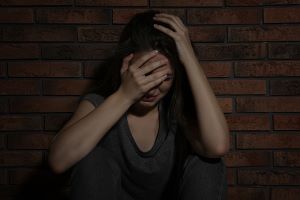 A new study published in the Journal of Biological Psychiatry looked at how the experience of corporal punishment might shape how the adolescent brain responds to mistakes and receiving rewards.
A new study published in the Journal of Biological Psychiatry looked at how the experience of corporal punishment might shape how the adolescent brain responds to mistakes and receiving rewards.
“One of the co-authors, Alexandria Meyer, has repeatedly shown that harsh parenting is associated with increased neural responses to making mistakes,” study author Kreshnik Burani told us. “That is, children of harsh/critical parents have brains that are hyper-reactive when they make mistakes.”
It is as if they have an internalized version of that harsh/critical parental voice when they make mistakes, Burani explained. The researchers haven't examined whether this effect might be related to corporal punishment, more specifically.
“In a separate line of work, we linked depression and stress to reduced neural response to rewards,” Burani told us, “and here we wanted to test whether harsh/critical parenting, and corporal punishment more specifically, might also predict reduced neural response to rewards among adolescents.”
For over a decade, researchers been studying increased error-related brain activity in relation to anxiety, and decreased reward-related brain activity in relation to depression. An increased neural response to making mistakes is associated with anxiety and risk for anxiety, whereas a decreased neural response to receiving reward is associated with depression and risk for depression.
“We have become increasingly interested in better understanding environmental factors that shape these brain responses - especially early in development - so that we might better understand how aversive experiences alter the brain to confer risk for anxiety and depression,” Burani told us. “Ultimately, we're hoping to find pathways for intervention and prevention - and to better understand specific mechanisms of risk for anxiety and depression.”
To test their theory, the research team examined groups of adolescents who reported corporal punishment versus those who did not report corporal punishment on the stress and adversity inventory (STRAIN)--which assesses lifetime stress exposure. They then compared self-reported anxiety, depression, and brain activity between these groups.
Among 149 adolescents, 52 reported lifetime corporal punishment. These adolescents were more anxious and depressed and they had increased neural response to their errors and decreased neural response to receiving rewards compared to the 97 adolescents who did not report lifetime corporal punishment.
“We were surprised that the impact of corporal punishment wasn't explained by harsh/critical parenting, or even stress exposure, more broadly,” study author Greg Hajcak told us. “That suggests that there might be something specific about corporal punishment that impacts brain activity that has been previously associated with risk for anxiety and depression.”
These neuroscience data are more evidence that corporal punishment has a negative impact on children. The next step in this line of work is to test these effects using longitudinal study designs, so that researchers can really examine whether, how, and when corporal punishment changes neurodevelopment.
“We might start thinking about interventions for those who have experienced corporal punishment aimed to decrease sensitivity to mistakes and increase reactivity to rewards,” Hajcak told us.
Patricia Tomasi is a mom, maternal mental health advocate, journalist, and speaker. She writes regularly for the Huffington Post Canada, focusing primarily on maternal mental health after suffering from severe postpartum anxiety twice. You can find her Huffington Post biography here. Patricia is also a Patient Expert Advisor for the North American-based, Maternal Mental Health Research Collective and is the founder of the online peer support group - Facebook Postpartum Depression & Anxiety Support Group - with over 1500 members worldwide. Blog: www.patriciatomasiblog.wordpress.com
Email: tomasi.patricia@gmail.com